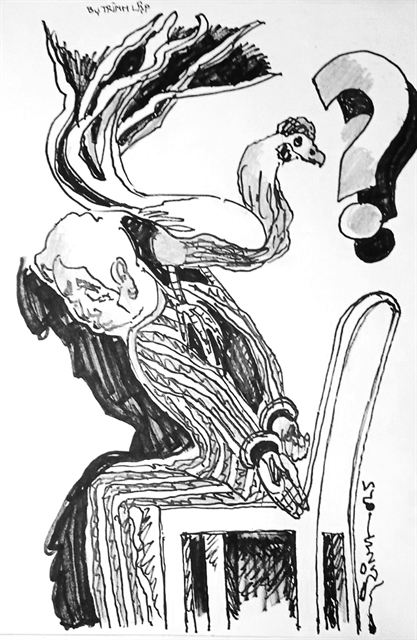If anyone wants to experiment on protected species, whether animals or plants, they need authorisation to do so, experts advise.

Illustration by Trịnh Lập
by Nguyễn Mỹ Hà
Count me in among the many people who felt their heart skip a beat upon seeing the man rushed away in a police van to be imprisoned for six years, his wife and three small children all crying helplessly as he was taken away.
The man, Thái Khắc Thành, did not rob anyone of their money nor hurt anyone. He did not embezzle any of the state budget or borrow money without returning it on time.
His crime was to have illegally raised a pair of silver pheasants (Lophura nycthemera), with the male bird possessing a long, beautiful tail, and bred them until they multiplied into 13 birds.
The silver pheasants have been listed in Việt Nam's Red Book of Endangered Species under Chapter 2 of the Penal Code, which states that anyone violating laws protecting endangered flora and fauna species, or those listed under international conventions on protecting rare species, should be fined from VNĐ500 million (US$18,900) to VNĐ2 billion (US$81,300), or be brought to court and sentenced to between one and five years in jail.
Activities on the list of illegal practices include hunting, killing, raising, keeping, trafficking and buying or selling animals on the Endangered Species list. Other activities include storing, transporting and illegally trading individual animals, their body parts, or products made from protected animals.
Elephant ivory from 2kg up to 20kg, and rhino horns between 50g and under 1kg, are also covered under these rules.
Thành was arrested back in April when he was delivering 10 white pheasants to an online buyer. Police searched his home and seized three more pheasants, bringing the total to 13. Before July 1, he was charged, brought to court and sentenced to six years in jail. He was sentenced by a court in what is now Hưng Yên Province.
Thành, 45, appealed to a higher court, and in August his case was heard by the Zone 5 Court in the same province. He was cleared of all charges and released immediately because, from July 1, silver pheasants were moved from the list of Severely Endangered Species to another, less restrictive category.
The preliminary court had not updated itself on the latest regulation, effective from July 1, which reclassified silver pheasants, along with others including Vietnamese pheasants (formerly Edward’s pheasants) and tragopans, on a list allowing limited exploitation and use for commercial purposes.
For having illegally raised silver pheasants in captivity, Thành now faces a lighter penalty – a fine between VNĐ150 million and 200 million (US$6,000 and 8,000) – and is restricted from leaving his residence.
Forest fairies
The silver pheasants are large birds under the Galliformes order. They have red facial skin and red feet. The males have black feathers beneath a white-feathered coat and long, sleek tail feathers that are smooth like satin. The females have brownish-yellow plumage. Known as “forest fairies”, silver pheasants are highly selective about their habitat, and their presence is considered an indicator of the health and integrity of the local ecosystem.
They often live in woodland scattered with various bamboo species growing along streams. They usually live in groups of five to ten birds and are rarely seen alone or in pairs.
Found in their natural habitat in southern China and mountainous regions in Việt Nam, silver pheasants until recently had become increasingly rare in the wild.
Having successfully bred and raised silver pheasants in captivity, Thành should have registered the birds he was keeping with the local forest rangers.
On August 18, locals in Hồ Chí Minh City reported large stray birds to city forest rangers, which were later identified as silver pheasants and taken in for further care. Currently, HCM City Zoo and Botanical Gardens also keep silver pheasants in captivity.
The question has since been raised by many: why are silver pheasants still listed as rare and endangered if they are already being raised in captivity?
According to the World Wide Fund for Nature, a species is considered truly preserved only when it exists in its natural habitat without human interference.
Phạm Văn Thế, a preservation expert and lecturer at Văn Lang University in HCM City, told Việt Nam News that anyone who is passionate about preservation or biology needs to take part in the legal and proper way.
“If anyone wants to experiment on protected species, whether animals or plants, they need authorisation to do so," he said.
"Register with local forest rangers and report to the Ministry of Science and Technology to get proper guidance. Do not act on your own, or take a protected plant or animal from the forest home thinking you are trying to preserve it."
For silver pheasant enthusiasts like Thành, he will now need to register his birds, have their living conditions inspected and gain approval.
Meanwhile, in several other cases, endangered species kept under authorised care have become malnourished, and some have even died. Members of the public have suggested that people like Thành could be offered work helping out in rescue centres, where his birds could also be properly checked.
Once the birds become more adapted to new environments, they could eventually be allowed to live and wander freely in parks, tagged with coded bracelets for monitoring. VNS